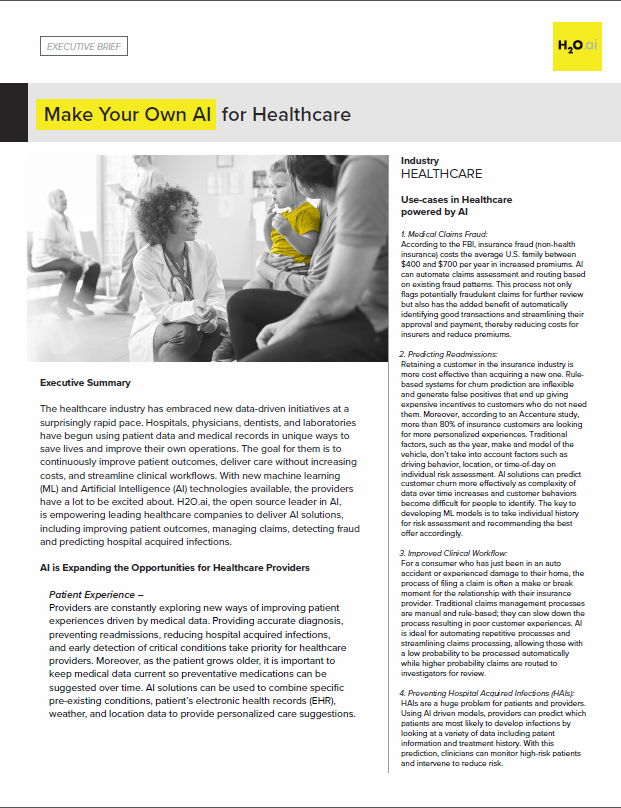Make Your Own AI for Healthcare
AI is Expanding the Opportunities for Healthcare Providers
Executive Summary
The healthcare industry has embraced new data-driven initiatives at a surprisingly rapid pace. Hospitals, physicians, dentists, and laboratories have begun using patient data and medical records in unique ways to save lives and improve their own operations. The goal for them is to continuously improve patient outcomes, deliver care without increasing costs, and streamline clinical workflows. With new machine learning (ML) and Artificial Intelligence (AI) technologies available, the providers have a lot to be excited about. H2O.ai, the open source leader in AI, is empowering leading healthcare companies to deliver AI solutions, including improving patient outcomes, managing claims, detecting fraud and predicting hospital acquired infections.


AI is Expanding the Opportunities for Healthcare Providers
Patient Experience –
Providers are constantly exploring new ways of improving patient experiences driven by medical data. Providing accurate diagnosis, preventing readmissions, reducing hospital acquired infections, and early detection of critical conditions take priority for healthcare providers. Moreover, as the patient grows older, it is important to keep medical data current so preventative medications can be suggested over time. AI solutions can be used to combine specific pre-existing conditions, patient’s electronic health records (EHR), weather, and location data to provide personalized care suggestions.
Claims Management –
Denied claims are a huge expense for providers, and these result in increased cost of care as well as healthcare premiums. Every denied claim is either resubmitted or written off by the providers – a painful process. Similarly, fraudulent claims take more resources for payers to process especially when the process is manual or rules-based. ML can be instrumental in automated claims management, routing only valid claims and providing a more personalized approach to claims processing — all of this while keeping the financial viability intact. In addition, augmenting automated claims management with people at the right step can drastically improve the process and the overall reputation of the providers and payers for adopting modern techniques.
Operational Excellence –
Improving their own day-to-day operations is as important for healthcare providers as is improving customer experience. Augmenting existing human-based practices with intelligent virtual assistants, automation of tedious processes, and fast and accurate updation of medical records allows clinicians more time to spend with patients. Moreover, an AI-assisted decision support system can be used for an unbiased second opinion in case the provider misses an important data point in the diagnosis.
Use-cases in Healthcare powered by AI
Why H2O.ai for Healthcare – AI to do AI
H2O.ai offers an award-winning automatic machine learning platform in Driverless AI and has been recognized as an industry leader in the Forrester New WaveTM: Automation-Focused Machine Learning Solutions, Q2 2019. H2O, open source, is already being used by hundreds of thousands of data scientists and is deployed at over 18,000 organizations across nearly every industry.
H2O Driverless AI empowers data scientists, data engineers, mathematicians, statisticians and domain scientists to work on projects faster and more efficiently by using automation to accomplish tasks that can take months and can now be reduced to hours or minutes by delivering automatic feature engineering, model validation, model tuning, model selection and deployment, machine learning interpretability, time-series, NLP, automatic pipeline generation for model scoring and automatic documentation with reason codes, and now bring your own recipes and model operations and administration.
The new innovations and capabilities will enable customers to accelerate their AI transformations in the Healthcare industry.
1. Medical Claims Fraud:
According to the FBI, insurance fraud (non-health insurance) costs the average U.S. family between $400 and $700 per year in increased premiums. AI can automate claims assessment and routing based on existing fraud patterns. This process not only flags potentially fraudulent claims for further review but also has the added benefit of automatically identifying good transactions and streamlining their approval and payment, thereby reducing costs for insurers and reduce premiums.
2. Predicting Readmissions:
Retaining a customer in the insurance industry is more cost effective than acquiring a new one. Rule-based systems for churn prediction are inflexible and generate false positives that end up giving expensive incentives to customers who do not need them. Moreover, according to an Accenture study, more than 80% of insurance customers are looking for more personalized experiences. Traditional factors, such as the year, make and model of the vehicle, don’t take into account factors such as driving behavior, location, or time-of-day on individual risk assessment. AI solutions can predict customer churn more effectively as complexity of data over time increases and customer behaviors become difficult for people to identify. The key to developing ML models is to take individual history for risk assessment and recommending the best offer accordingly.
3. Improved Clinical Workflow:
For a consumer who has just been in an auto accident or experienced damage to their home, the process of filing a claim is often a make or break moment for the relationship with their insurance provider. Traditional claims management processes are manual and rule-based; they can slow down the process resulting in poor customer experiences. AI is ideal for automating repetitive processes and streamlining claims processing, allowing those with a low probability to be processed automatically while higher probability claims are routed to investigators for review.
4. Preventing Hospital Acquired Infections (HAIs):
HAIs are a huge problem for patients and providers. Using AI driven models, providers can predict which patients are most likely to develop infections by looking at a variety of data including patent information and treatment history. With this prediction, clinicians can monitor high-risk patients and intervene to reduce risk.
Customer Case Studies
- Change Healthcare
- Kaiser Permanente
Change Healthcare sits at the center of healthcare providers, payers, and consumers. As an independent healthcare IT company, they help process over 12 billion transactions annually covering 5,500 hospitals, 800,000 physicians, 130,000 dentists and 600 laboratories. They help provider organizations to process claims with payers. When a valid claim is denied by a payer for incorrect coding or other reasons they help the providers to reprocess the claims and collect the payment. Enhancing this process to find the claims that are most likely to be accepted and will yield the most value to the provider creates extensive value for Change Healthcare’s clients. Using H2O, the Change Healthcare team creates models to predict which claims are likely to be viable.
Kaiser uses H2O to implement an Early Warning System (EWS) called Advanced Alert Monitoring (AAM) to identify patients experiencing physiological derangement early-on - approximately 6-24 hours in advance - and transfer them to the Intensive Care Unit (ICU) instead of waiting till it is too late. The EWS is based on an in-depth risk analysis and demographic data.
Win with AI – Get Started Today
AI is critical to success in the healthcare industry. Driverless AI enables insurers to improve personalized delivery of care, predict illness, fraudulent claims detection and claim processing.










